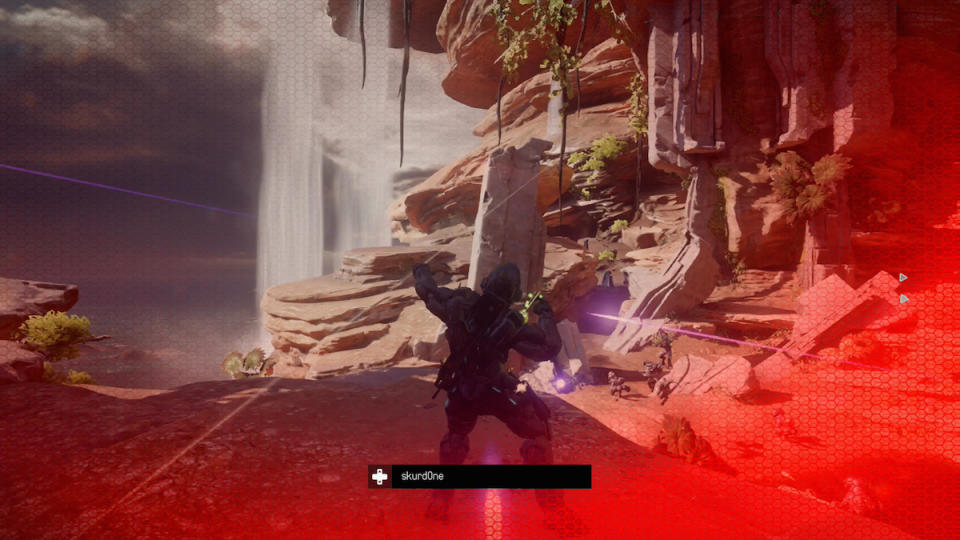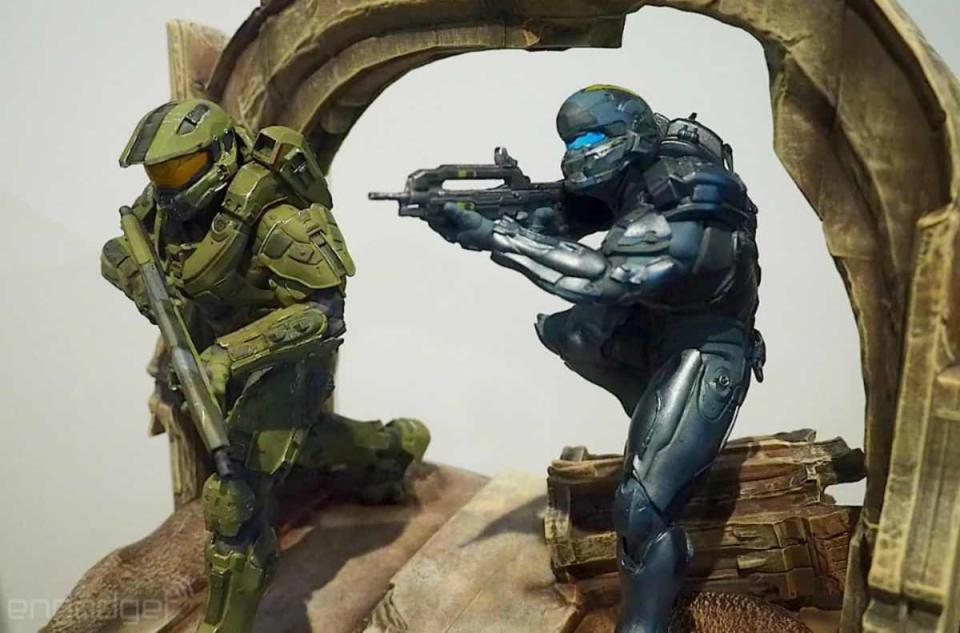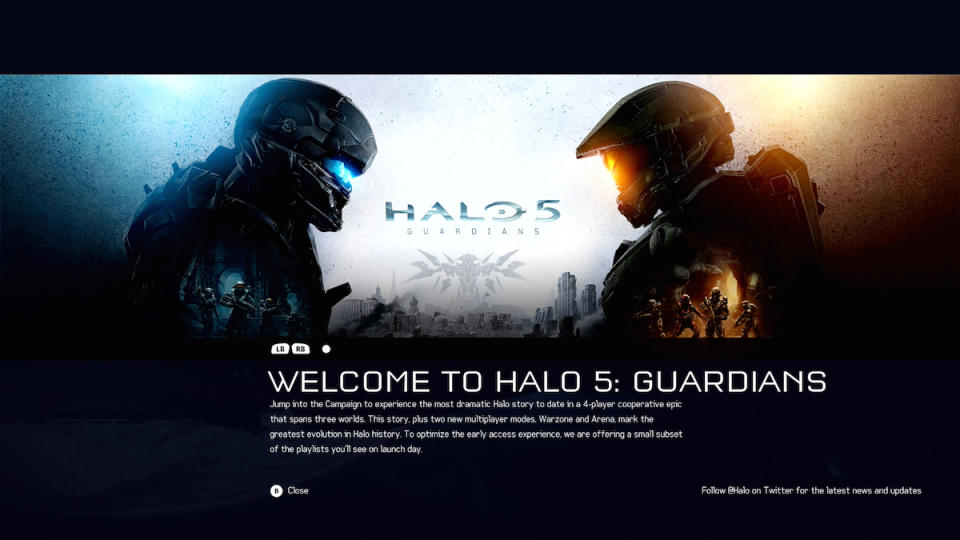I played through 'Halo 5: Guardians' solo and hated it

This article contains spoilers. Proceed at your own risk.
Halo 5: Guardians is not the Halo you remember. It's a different kind of game altogether, something that more closely resembles a modern first-person shooter that focuses on multiplayer rather than a strong solo experience. This isn't the first time that's happened, but it is the first time in 11 years that a new Halo campaign feels like a massive step backward compared to its predecessor. Microsoft-owned studio 343 Industries is capable of better than this and proved as much with its killer freshman effort, Halo 4. But instead of addressing what it got wrong with that installment (e.g., an unexplained main villain) and doubling down on what it did right (e.g., an emotional storyline and constantly varying gameplay), the team fundamentally altered how a Halo campaign works to horrendous results.
A few worthless Spartans
The developers at 343 say that Halo 5's story is part of "the greatest evolution in Halo history," but that transformation comes at a price. The change here is that regardless of which protagonist you play as (either manhunter Jameson Locke or his target, returning super soldier Master Chief), you'll be babysitting squads of mindless AI teammates 100 percent of the time. Basically, they exist so your online-only co-op buddies can play as real characters instead of clones of Master Chief that disappear in story scenes. Halo has had co-op play since its 2001 debut, but playing solo was never a subpar experience as a result; playing through the campaign in co-op existed as its own separate thing. In Guardians, co-op's been shoehorned into the narrative at the detriment of enjoying the game's story during solo play.
Previous entries in the series had players fighting alongside hilarious Marines who acted like disposable lemmings; I never had to rely on them for much more than comic relief. Those games also featured long stretches where I could be alone with my thoughts and explore at my own pace. What's more, having the occasional break from the troops made me actively look forward to the next time we fought together. That isn't the case here.
Imagine the adorably dim-witted allies having their personalities removed and being charged with keeping you alive, and you've got Halo 5's squad-mates. In theory, they'd be an awesome asset because they're the same type of super soldiers, dubbed Spartans, you play as. Except I'd never have known they were the best warriors in the galaxy by how they acted here. Most of the time, my squad just stood out in the open soaking up enemy gunfire and adding nothing to the gameplay at all, as opposed to working as a team and absolutely destroying every enemy the way they do in non-interactive story scenes. For a solo player such as myself, there's no real payoff for this massive change.
The secret history
I was a gigantic nerd for Halo lore with the first few games, but it quickly became much less manageable to read every book because there was simply too much canonized fiction and it wildly varied in quality. Consider Halo 4's lead-in: the live-action direct-to-internet Forward Unto Dawn. Microsoft had finally given fans the Halo movie they'd been clamoring for and it was an absolute bore. After being burned by that, I wasn't too excited about potentially wasting my time watching Locke's origin story in the Ridley Scott-produced Halo: Nightfall.
But if I wanted to actually learn about his character, it'd be required viewing because by the time Halo 5's credits rolled, I couldn't tell you a single thing about him or his Fireteam Osiris except that Nathan Fillion (who reprises his role as now-Spartan Edward Buck) is his typical smart-ass self. Master Chief's Blue Team actually fares worse because there isn't a Buck-like "star." The elite squad plays key roles in tie-in novels, but 343 doesn't do anything to establish who they are in-game.
Early on you overhear Blue Team talking about Master Chief's service record, saying that his years of continuous battle must be having an effect on him. That promising theme is never explored beyond a single hallucination in the first of three missions he stars in. The problem with Guardians' storyline isn't that you only play as Master Chief for a third of the game; it's that his scant inclusion here feels like an afterthought; a bone tossed half-heartedly to returning players. It wouldn't be as much of an issue if his replacement, Locke, was actually interesting and given cool stuff to do, but he isn't. So it is.
Death becomes Halo
Death in Halo has always meant I'd die; my corpse would comically ragdoll around; enemies would quip about their kill; and the game would reload instantaneously. Guardians switches the formula with the inclusion of a rescue system. Now when you fall in combat, a computer- (or human-) controlled squad-mate has a finite amount of time to not die themselves before performing a revive, lest you bleed out and return to the previous checkpoint. All told, that results in anywhere from 15 to 45 seconds of being completely infantilized as the battle rages on. This revive mechanic brings the game to a grinding halt and the mandatory pause hinders any sense of low-risk experimentation in changing up tactics. By my estimates, Guardians wasted at least an hour of my playtime thanks to the new revive system.

Master Chief (left) and Jameson Locke (right) in happier times.
When my squad inevitably got knocked out and I was left standing in single-player mode, I never really cared to rescue them and I'm pretty sure that feeling was mutual. It was never a guarantee they'd get to me safely and I didn't feel like their top priority. On the flipside, I always looked forward to my squad dying so I could have some alone time. But the moments of solitude when they were all gone were a tease: They'd inexplicably resurrect themselves to finish the fight and yell at me to keep moving forward.
I always looked forward to my squad dying so I could have some alone time.
In Guardians, you'll die a lot -- especially if you're playing alone on the higher difficulty settings. It's always been that way. The thing is, none of my 237 deaths in the game (there's a counter) felt like the result of an enemy outsmarting me. Rather, it was because I was outgunned. And if I wanted that type of experience, I'd hop into adversarial multiplayer online. Almost every death I endured felt cheap, a frustration that mounted when coupled with the scattershot teammate AI. So much so that in the interest of reducing my blood pressure, I resorted to skipping past enemy encounters in the last levels and bumping the difficulty down because I couldn't take it anymore. And were it not for the need to finish the game for this critique, I wouldn't have even done that -- I'd have stopped playing outright. When the primary gameplay -- combat, in this case -- isn't fun, that's a massive problem.
Artificially unintelligent
In the Bungie-led games and 343's own Halo 4 there was always a sense of variety and surprise while fighting -- that's all but missing here. Previously, the robotic Prometheans fought intelligently. A low-flying drone offered a shield capability to ground forces and it'd even vacuum up grenades before they'd hit my target. Panther-like metallic creatures would skitter this way and that, avoiding incoming fire and taking potshots every now and again. In Halo, it always felt like the AI was thinking.
Not here. A vast majority of the battles are monotonous large-scale affairs that, while technically impressive, are just noisy and a chore to complete. The combat's just a hoop to jump through to get to the next weak story sequence. In the last few missions, that became increasingly apparent when I was just fighting wave after wave of enemies in what felt like a poorly executed version of the franchise's arcadey, wave-based "Firefight" mode.

My squad's tactical usefulness during battle was questionable as well. For instance, I couldn't direct the Halo fiction's best sniper, Linda, toward a vantage point to kill out-of-reach enemies and have other members of the legendary Blue Team flank two hulking Hunters while I attacked their weak spots from behind. All you're able to do is direct them to a specific location or to attack one enemy. The trio moves and fights as a singular unit and the only useful squad order was to send them ahead to act like a bullet-sponge before I entered a new area. And even then, their effectiveness was hit or miss.
A vast majority of the battles are monotonous large-scale affairs that, while technically impressive, are just a chore to complete.
Counter that with something like the Mass Effect series, which had incredibly useful teammates that each served unique and important roles during combat, and you'll see just how poorly implemented the system here is. Squad commands are just too shallow to be useful, which makes me question why they were even added in the first place. Sure, the team members in Guardians have context for the now online-only co-op, but when Bungie did something similar for Halo 3, you didn't have the chore of directing limp AI because you were playing solo. Babysitting these AI squad mates also served as a painful reminder that even if I wanted to bring friends in to fight alongside me locally, I couldn't.
The whole way through the game, it felt like I wasn't welcome because I was playing by myself. The only thing that pulled me through one tiresome firefight to the next was the promise of meeting returning characters. And even then there was no real payoff. The sole bright spot occurred when the game offered up what made past Halo entries fun: massive outdoor environments, exploration and encounters with clever enemies. But that didn't happen until missions seven, eight and nine, and after that, Guardians went back to feeding me garbage.
In the months leading up to the Halo 5: Guardians release, 343 repeatedly said that hitting a silky smooth 60 frames per second was the top priority and that it wouldn't let anything get in the way of that -- not even the couch co-op that'd appeared in every release prior. Apparently, making sure Guardians was fun to play solo wasn't high on the list, either.


